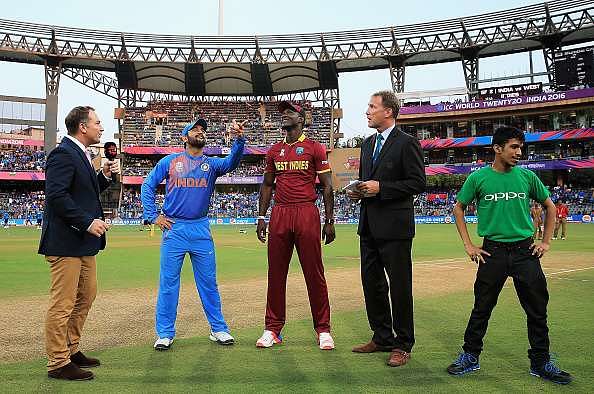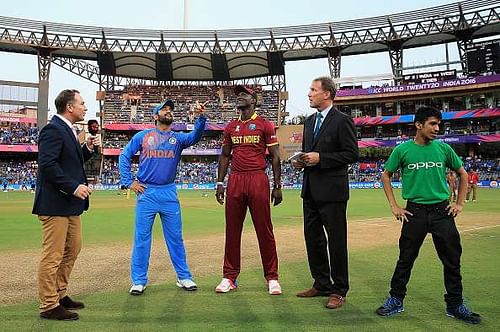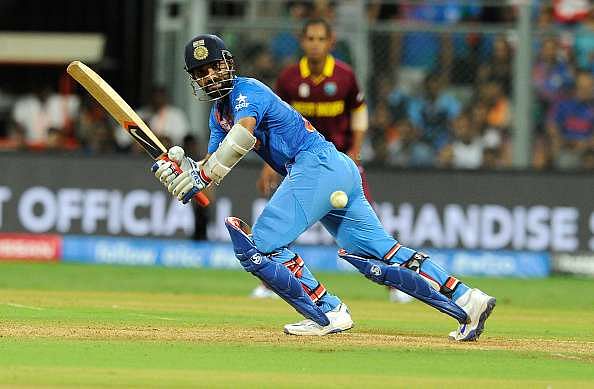
ICC T20 World Cup 2016: Toss, Ajinkya Rahane and No balls - Three factors that worked against India in semi-final
West Indies take an early lead
Big game, bat first, put runs on the board - the oft-repeated cliche in cricket. But the reverse of it was what either of the teams was looking to do in Mumbai, and rightly so.
While there are always the obvious factors like the nature of the deck, dew and ground size, India needed the chase more badly than West Indies for a more important reason. At venues like Wankhede, one of the better ways of defeating teams like West Indies and England, two outfits with an insane batting depth, is by making them bat first.
More often than not, such teams – while setting a target – don’t realise their actual potential and settle for a score much lesser than they are actually capable of. You can also eliminate the possibility of them making complete use of their batting depth and, especially in the case of West Indies, cash in on the mistakes that they commit with their batting order.
You need not go far back to understand this. For all their "fearless” bandwagon, it has happened with England twice in this very tournament – against West Indies which they convincingly lost and against Sri Lanka which they barely scraped through. For 15 overs of the match against the Angelo Mathews-led side, England were batting on the deck thinking it was slow and low - an after-effect of what had happened in their match against Afghanistan - and nearly screwed it up.
They were fortunate that Buttler happened, and the score moved from 99/3 in 15 overs to 171/4 in 20 overs – still only a target within Sri Lanka’s sights. On another day, Buttler would not have been able to help them do that or Sri Lanka, even with possibly their worst batting line-up of the last two decades, would have chased it down.
Batting-heavy sides and their Achilles heel
While England have been circumspect because of them getting bundled out repeatedly by South Africa in their build-up to the tournament, West Indies, in addition to the possibility of underachieving with the bat while playing first, also have a different weakness – a messed-up batting order that features their third-best match-winner, Carlos Brathwaite, at No.9.
That Brathwaite bats as low, Lendl Simmons is positioned to bat at No.4 and Denesh Ramdin is being regularly sent up the order to ‘stabilise the innings’ when it is totally not needed says you can always count on them to fall short of the target they would otherwise be capable of. Had Simmons’ entry been a little delayed against India, I doubt he could have had such an effect, being a player who is ideally suited to opening the innings. That he had two reprieves, even discounting the catch at long-on, to eventually end up playing the innings he did does tell you something about asking him to play in the middle order.
But for all of these factors to come in, West Indies had to bat first. Once they chase, their eyes will be set on the target. Whatever it is, 140 or 250, they will go for it. And in the process they are either going to win it or at least make use of their entire batting depth in an attempt to chase it down.
The toss is done and dusted. All you can do now is control what is in your hands, but did you?
Rahane pulls it back further
It's either Ajinkya Rahane or the decision to ask him to play the way he played. How do you strategise for setting a target against West Indies on a flat deck? Here are my two most crucial factors to consider:
- You are setting a target for the likes of Chris Gayle, Andre Russell, Lendl Simmons and Carlos Brathwaite. And this is not including Dwayne Bravo, Darren Sammy and Marlon Samuels who can all click as well on their day.
- If there is anything that’s going to trouble you in their bowling line-up, it’s Bravo’s death bowling. And how do you counter it? By going hammer and tongs up front and hoping you can take 10 off each of Bravo's overs?
This Indian team didn't. For some bizarre reason, they thought they could rotate the strike till 16th over. I can hear that ‘but India still scored 192’. 190 is still 30 short, and they did that because Virat Kohli played a superhuman knock yet again. You don’t plan for something hoping such extraordinary things happen. If Kohli hadn’t, West Indies would have completely aced it.
Clueless Indian think-tank
What is unclear is whether Rahane was under instructions to play such a knock or he himself decided it was the right way to go about things. To understand that, it’s important to note what MS Dhoni said on Rahane's knock after the match: “This is the kind of innings that is expected of him. I’m glad that after facing a few deliveries he got a start and did what he does best.”
What Dhoni has said is a lot different from saying that the team management wanted Rahane to play such an innings; it could just mean Dhoni doesn’t expect more from him and hence wasn’t surprised. The Indian captain’s expectations of a player being the parameter is one of the reasons why India finds itself in the situation it does currently.
For argument’s sake, if you consider Rahane was indeed asked to play a run-a-ball knock, it only raises serious questions of the Indian think-tank’s credentials. I wouldn't, however, really be surprised if that's the case, given how they have played for years now and the lack of innovation in the side.
Right move, Wrong day
Make no mistake, I am not making a permanent case for Dhawan. He should have been axed long back, but his knack of getting in the right knocks at the right time continued to save him his position in the side. But if there is one deck and against one team that you need a player like Dhawan even in his current form (which by the way wasn’t too bad coming into the tournament), it is Mumbai and it is against West Indies.
You are playing on a pitch that doesn't seam or spin and against a team that can't bounce the 30-year-old out, probably with the exception of Andre Russell who would have bowled a maximum of 2 overs at him. What a bad, bad day to miss out on a bully like him? He at least gets out if he is not able to do anything of note. Not to forget that the opposition had a leg-spinner and a left-arm spinner in their ranks, and India let them bowl to four right-handers.
Dhawan’s numbers in the tournament are thrown at me when I say this, but his performance on decks that are a lot more difficult to bat on can’t be compared to Wankhede scenario. Mohali could have been a little better, but the Australian attack had bowlers who could hurry up the left-hander unlike West Indies. When you have persisted with him for so long, you could have just seen through this tournament.
Rahane might still be a good long-term decision though, as there are certain advantages with having a player like him in your T20 side – the most important of them being targets like 130 and 140 could be chased down on difficult wickets without much trouble. Probably India wouldn't have lost against New Zealand with him in the team, or at least put up a better fight. But against West Indies the move failed, and failed miserably.
Look up to Hashim Amla
In general, I don't understand why anyone has to take the role of rotating the strike on such decks in T20 cricket. You have seen 230 being chased down on this wicket and 180 in just 18.1 overs not long ago, what does it say about your game awareness if you think you can go along taking singles and twos till 15th over?
Take the example of Hashim Amla, if anything a player with more limitations when it comes to attacking cricket, who put in a series of compelling performances to push his way back into the South African T20 side. He has scores of 69* (at 181.57), 97* (at 156.45), 58 and 56* in 4 off his last 6 T20I matches. Playing on the same Mumbai deck, Amla scored 58 at a strike-rate of 187.09 against England. Not surprising that the Proteas ended up with a score of 229 without any meaningful contributions from AB de Villiers and Faf du Plessis.
Rotating strike the entire match on a road like Mumbai should be as big a crime as playing a rash shot when the situation doesn’t demand taking risks. Big-hitters are slated for their “lack of brains” in such cases, but not hogging the strike is something that the purists love, so you get away with it.

